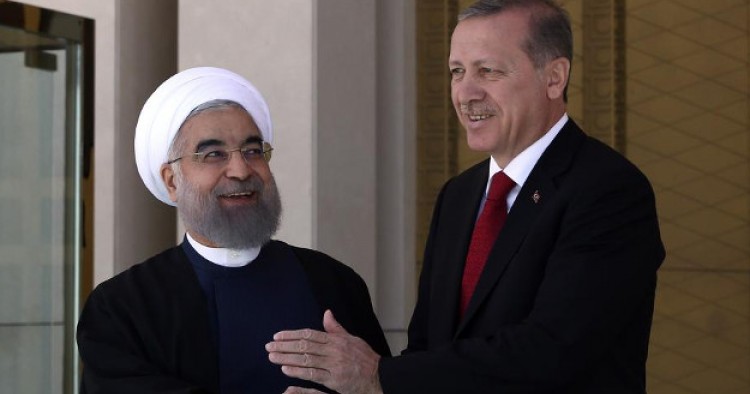Iranian President Hassan Rouhani and his Turkish counterpart Recep Tayyip Erdogan have agreed to continue cooperation in Syria despite the two countries’ differences over the latest US-led strikes against Syrian government military sites, the Iranian media reported. In a telephone call earlier today, the Iranian and Turkish presidents said they will work closely with Russia as part of their trilateral partnership to end the Syrian conflict and protect Syria’s territorial integrity and sovereignty. “The two countries should bolster cooperation and must not allow tensions in this country [Syria] to escalate,” Rouhani told Erdogan. According to the readout of the phone call reported by the Iranian press, Rouhani condemned the latest strikes by the US, Britain and France. “This is a wicked invention in international relations that some powerful and bullying countries attack a country whenever they want,” Rouhani reportedly told Erdogan. Erdogan reportedly called for further strengthening bilateral ties between the two countries, particularly in the economic and trade areas. According to Erdogan, the Turkish minister of economy will sign several bilateral economic agreements with his Iranian counterpart during his visit Tehran.
Comment: The US-led strike against Syrian regime targets suspected of developing and using chemical weapons yet again demonstrated the fact that Turkey’s policies and interests in Syria diverge from those of Iran and Russia despite the three countries’ cooperation in recent months.
Ankara’s strong support for the strikes raised a lot of questions in Tehran about Turkey’s reliability as a potential partner on regional affairs. Media outlets affiliated with the Islamic Revolution Guards Corps (IRGC), which recently shunned away from criticizing Turkey, expressed dismay at Ankara’s siding with Washington over the Syrian conflict yet again.
“Can the Americans, who have been plotting against Turkey in recent years, not conspire against Turkey in Syria as well? Aren’t they the same Americans that dispatched 5,000 truckloads of weapons to the PKK rebels and plan to set up a PKK government in northern Syria?” wrote Tasnim News Agency, an IRGC mouthpiece.
According the article in Tasnim, the ruling Justice and Development Party in Turkey is in a “difficult position” in the run-up to the elections and is therefore seeking to repair Ankara’s ties with Washington to obtain the votes of pro-American Turkish citizens. “Can Erdogan rescue himself from economic and political defeat by supporting the American attacks?” the article queried, and then emphasized that it was a “big mistake”. The article cautioned the Erdogan government that Washington will continue to undermine the Justice and Development Party in the upcoming elections and will try to install its preferred party in Turkey.
Although Iran and Turkey have been trying to accommodate each other’s concerns in Syria and Iraq, the thaw in relations between the two countries represent more a marriage of convenience than a strategic partnership. Divergent interests in the region and a long history of mistrust are likely to continue to mar relations between the two major Middle Eastern powers. But Turkey and Iran have historically managed to compartmentalize their relations, and they will most likely continue to do so. Tehran and Ankara, for example, maintained economic and trade ties even at times when relations between the two countries over the Syrian conflict and other regional issues had reached their nadir.
The Middle East Institute (MEI) is an independent, non-partisan, non-for-profit, educational organization. It does not engage in advocacy and its scholars’ opinions are their own. MEI welcomes financial donations, but retains sole editorial control over its work and its publications reflect only the authors’ views. For a listing of MEI donors, please click here.












